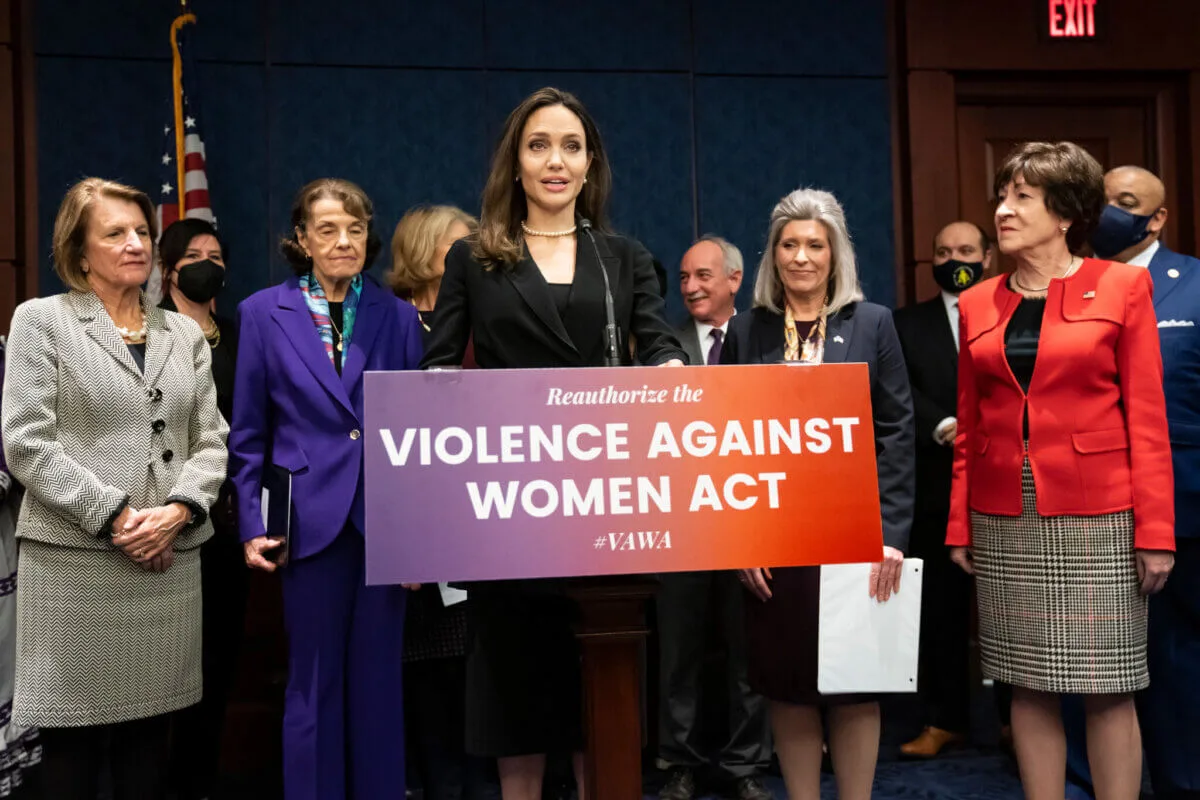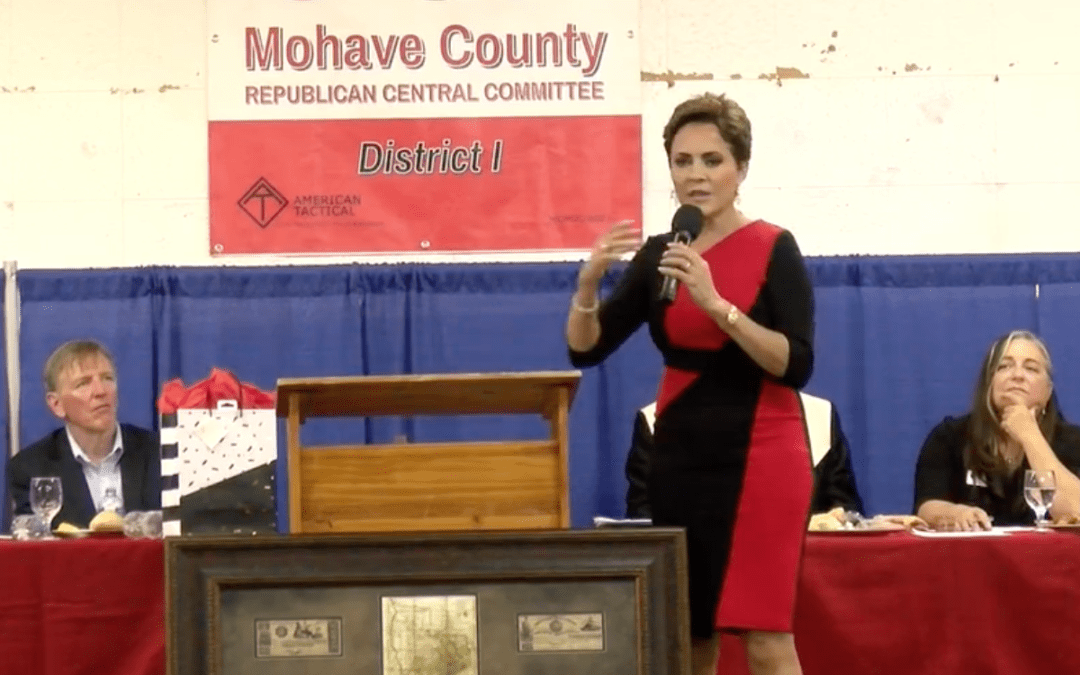
Actress and activist Angelina Jolie, center, joins, from left, Sen. Shelley Moore Capito, R-W.Va., Sen. Dianne Feinstein, D-Calif., Sen. Joni Ernst, R-Iowa, and Sen. Susan Collins, R-Maine, at a news conference to announce a bipartisan update to the Violence Against Women Act, at the Capitol in Washington, Wednesday, Feb. 9, 2022. (AP Photo/J. Scott Applewhite)
The reauthorization failed to close the “boyfriend loophole,” thanks to pushback from Republicans.
Three years after its expiration, a crucial law credited for reducing domestic violence nationwide is back on the books.
President Joe Biden signed into law the Violence Against Women Reauthorization Act on March 16 as part of the omnibus spending bill.
The legislation has been held back for years—VAWA expired in 2018 and was temporarily extended until February 2019.
The US House voted in March 2021 to reauthorize the legislation but faced opposition from the GOP. None of Arizona’s congressional Republicans voted for the measure. The Senate passed an amended version a year later, on March 10.
“It should not have taken so long but at the same time given what we’ve seen of the political process recently, I’m not surprised,” Jenna Panas, CEO of the Arizona Coalition to End Sexual and Domestic Violence, told The Copper Courier.
What VAWA Does
President Joe Biden first introduced the legislation in 1990, when he was a Democratic senator. It passed in 1994 with support from 73% of Democrats and 26% of Republicans. He has since called it his “proudest legislative accomplishment.”
Experts have credited the act with reducing domestic violence in the US by encouraging police and the country as a whole to take the issue seriously.
RELATED: Phoenix Attorney Explains Why VAWA Is Vital to Getting Domestic Violence Victims Access to Affordable Legal Services
VAWA has since been reauthorized three times, with the latest guaranteeing funding for programs that support survivors through 2027.
Local resources depend on this funding, including Arizona’s STOP Violence Against Women Grant, which distributes money to local programs to support the prosecution of violent crimes against women and helps strengthen victim services. Organizations like the Arizona Coalition to End Sexual and Domestic Violence, Arizona State University’s Office of Sex Trafficking Intervention Research, and Prevent Child Abuse Arizona have also received funding.
Changes Made
Panas said the reauthorization includes increased appropriations, which is “always helpful.”
“We’re excited about the expansion of the availability of sexual assault nurse exams for survivors of sexual assault, particularly in rural areas, because that is an issue that affects Arizona quite strongly,” Panas said. “It is difficult to get a SANE [Sexual Assault Nurse Examiner] exam in some parts of our state, you just have to drive, and so the support for that I think is going to have a direct impact on us.”
Panas said there are also increased housing protections and resources for survivors, which is important in Arizona, where costs are skyrocketing.
“It’s becoming more and more difficult for survivors to find housing, so those better housing protections will help survivors stay in the homes that they already have,” Panas said.
She said the reauthorization also reaffirms the sovereignty of tribes to be able to hold non-indigenous offenders of sexual violence accountable on tribal lands, something that has been “chipped away and eroded at” in recent years.
“That is particularly significant here because we do have 22 tribes, all of whom are sovereign, and so this allows those tribes to hold sovereignty rather than having to depend on external law enforcement agencies to hold those folks accountable,” Panas said.
However, some of the sticking points that the GOP raised when the House passed the bill were left out of the version the Senate passed.
The main point of controversy, the boyfriend loophole, still remains unsolved. Currently, spouses, parents, legal guardians, or people who live with their partners and are convicted of domestic violence cannot own guns. The VAWA reauthorization originally would have extended that ban to dating partners convicted of domestic violence, which drew ire from the National Rifle Association.
And while the 2022 bill increased legal protections for Native American, transgender, and immigrant women, Panas wanted to see more, particularly the expansion of the U Visa program for victims of crimes.
Lawmakers Celebrate Passage
US Sen. Kyrsten Sinema of Arizona celebrated the passage of the VAWA reauthorization, saying she was proud of the bipartisan effort.
“I’m proud lawmakers from both sides of the aisle came together and renewed the Violence Against Women Act, boosting programs protecting Arizona women and families, ensuring law enforcement—ncluding Tribal authorities—have the tools needed to crack down on abusers, and supporting survivors in Arizona and across the country,” Sinema said in a statement.
US Sen. Mark Kelly of Arizona also noted the reauthorization’s importance.
President Joe Biden said fighting domestic and sexual violence is “a matter of justice and compassion.”
“When I first wrote and championed the original VAWA legislation, it helped break a dam of congressional and cultural resistance that too often saw domestic violence as a ‘family issue,’ with legal and social burdens placed on survivors rather than perpetrators,” he said in a statement. “… And while studies have shown that domestic violence and sexual assault rates have declined significantly since VAWA took effect, we know that we still have work to do.”
One in four women reported being victims of “contact sexual violence, physical violence, and/or stalking by an intimate partner” in 2018. And at least 86 people were killed in homicides related to domestic violence that year in Arizona.
The Arizona Coalition to End Sexual & Domestic Violence operates a helpline connecting people with victim services specialists Monday-Friday from 8 a.m. to 5:30 p.m. The number is 602-279-2980. The National Domestic Violence Hotline is open 24/7 at 1-800-799-7233. There’s also a live chat option.
Looking for the latest Arizona news? Sign up for our FREE daily newsletter.
Politics

Kari Lake calls on Arizona county sheriffs to enforce 1864 abortion ban
Republican candidate for US Senate Kari Lake on Saturday seemed to solidify her support for Arizona’s total abortion ban and called on county...

VIDEO: Arizona Rep. Greg Stanton ‘We will not stay silent’ on abortion ban
@coppercourier "Under this extreme law, women will die, and their doctors and nurses will be criminalized. This cannot stand," Rep. Greg...
Local News

6 terrifying things that could happen if the Comstock Act is used to target abortion
Does 1873 sound like a really, really long time ago? Well, that’s because it is—but if Republicans and far-right anti-abortion activists have their...

ASU football slapped with probation due to violations during Herm Edwards era
The violations described in the NCAA statement include impermissible in-person recruiting contacts while the state of college athletics was...





